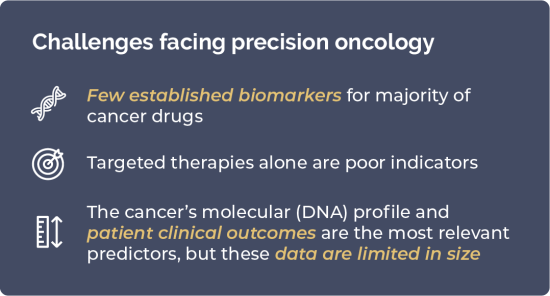Screen Ahead Rx
Screen Ahead Rx is a tool designed for individualized cancer treatment. The model predicts the anti-cancer drugs that will elicit an "exceptional response" in the cancer patient, based on the tumor's genomic profile and the drug's chemical structure. The Screen Ahead Rx team hopes to both improve individual cancer outcomes and seek potential new cancer treatments by employing novel machine learning techniques.
What’s the problem?
What did we do?
The goal of this project is to develop a machine learning model that successfully predicts how effective a drug will be in treating a given cancer based on the underlying properties of the cancer drug and the alterations to the cancer cells’ DNA. We created a number of novel embeddings to represent drug chemical structure, employing techniques used in NLP. We performed extensive feature engineering to characterize the cancer cell molecular features and encoded features based on biological knowledge of drug classes and cancer subtypes. A combination of different drug embeddings and cancer DNA feature sets were trained on a number of different machine learning architectures. These models were evaluated on the same set of never-seen cancer cell lines. The performance of these models and their predictions can be evaluated in interactive data visualizations on our website. This project will serve as the basis for a peer-reviewed paper that will identify the best features and architectures for modeling cancer drug response.












